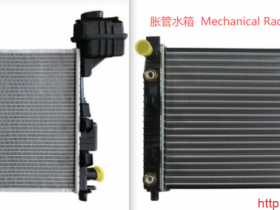- A+
category:Radiator
When your car's engine runs, it generates a lot of heat. If this heat isn't dissipated in time, the engine can overheat, leading to performance issues or even serious damage. This is where the car radiator plays a crucial role – it's the engine's "cooling guardian."

How the Radiator Works
The radiator is the core component of your car's cooling system. It works through a simple heat exchange principle:
- Heat Absorption: Coolant (typically a mixture of water and antifreeze) is pumped through channels inside the engine, absorbing the heat generated by the engine.
- Heat Dissipation: The heated coolant then flows into the radiator. The radiator consists of many thin, flat tubes and cooling fins. As the car moves, air flows over these fins, carrying away heat from the coolant.
- Circulation: The cooled liquid is then pumped back into the engine, creating a continuous cycle to keep the engine cool.
The Importance of the Radiator
A properly functioning radiator ensures your engine operates within its optimal temperature range, which helps to:
- Improve Fuel Efficiency: Engines run more efficiently at appropriate temperatures.
- Extend Engine Life: Prevents overheating damage to engine components.
- Ensure Driving Safety: Avoids breakdowns or performance degradation due to an overheated engine.
How to Maintain Your Radiator
To ensure your radiator works correctly, you should:
- Regularly check coolant levels: Make sure the coolant is within the normal range.
- Periodically replace coolant: Follow your car manufacturer's recommendations to prevent corrosion and buildup.
- Clean the radiator's exterior: Remove dust, leaves, and other debris from the cooling fins to maintain dissipation efficiency.
- Monitor the dashboard temperature gauge: If the temperature indicator rises abnormally, stop immediately and check.
Understanding and maintaining your car's radiator is a crucial step in ensuring your beloved vehicle runs smoothly!




